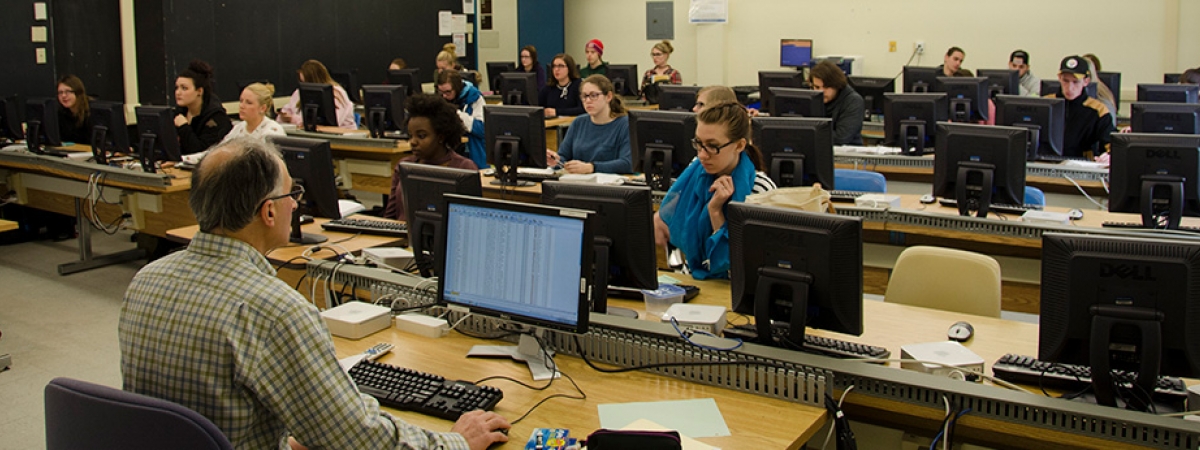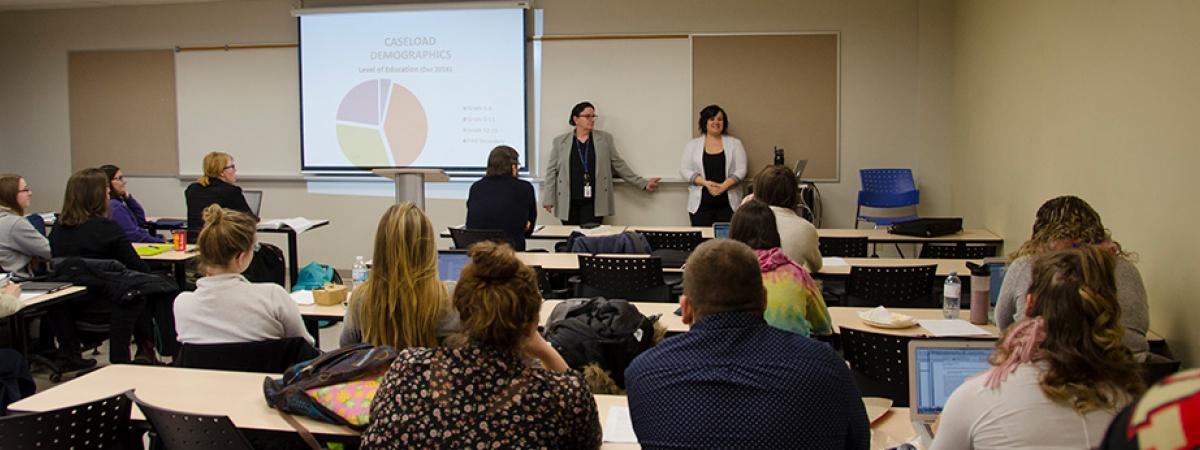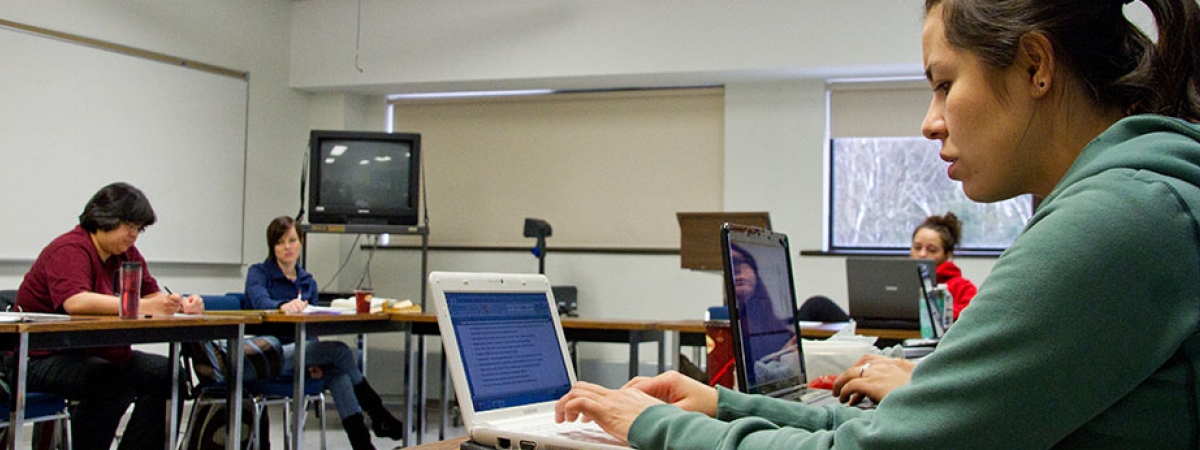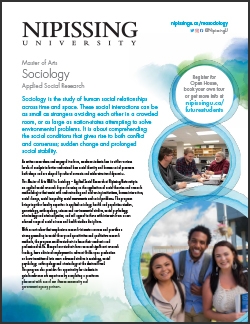Master of Arts in Sociology - Applied Social Research in our School of Graduate Studies
The Master of Arts (MA) in Sociology – Applied Social Research degree will focus on the application of social theories and research methodologies that assist in understanding and addressing the social problems and challenges of northern and rural communities, including Indigenous communities, in Canada and around the world. The program brings together faculty expertise in Sociology, Health and Populations Studies, Gerontology, Anthropology, Science and Environmental Studies, and Criminology and Criminal Justice. Active involvement in the community, government agency partners, a curriculum of research-intensive courses, and practicum placements will provide you with the theoretical foundations and quantitative and qualitative research skills to undertake applied research, evaluation and policy studies in government, not-for-profit and private organizations. There are three required courses that are the foundation of the degree and include: SOCI 5106 Advanced Sociological Theory; SOCI 5216 Research Design; and either SOCI 5217 Quantitative Analysis or SOCI 5417 Qualitative Analysis. You will be well prepared for more advanced studies in Sociology, Anthropology and Criminology at the doctoral level.
Program related questions can be directed to the Graduate Coordinator at GradSoc@nipissingu.ca
- Program
- Admissions, Applications, and Dates
- Tuition and Funding
- Facilities
- Resources
- Contact Us
- Opportunities
Master of Arts in Sociology (MA)
- Graduate Admission Requirements
- Program Requirements
- Graduate Studies Program and Degree Requirements
- Available Sociology (SOCI) Courses
- Complete listing of all courses
Streams/Specializations
Students have the option of completing the program through one of the following routes:
Major Research Paper (MRP) - Full-Time (one year program)
Major Research Paper (MRP) - Flex-Time (three year program)
Thesis Research Project (TRP) - Full-Time (two year program)
Thesis Research Project (TRP) - Flex-Time (four year program)
Major Research Paper (MRP) Route
The Major Research Paper (MRP) Full-Time option takes one year to complete (three consecutive terms: Fall, Winter, Spring/Summer) while the MRP Flex-Time option takes three years to complete (nine consecutive terms). Both the Full and Flex-Time options are designed for students who decide to conduct library-based research, including reviews of literature and secondary analyses of data (e.g. census and survey data) that focus on social issues and policy analysis affecting individuals and communities in northern and rural areas and elsewhere in Canada and abroad, and who plan to seek employment opportunities possibly as research or policy analysts/evaluators in government and the social services sector. Students will have a MRP committee to oversee and assist with their chosen project, made up of a faculty supervisor and one consulting committee member drawn from a government, community or private organization directly related to their MRP topic. Students in the MRP option will complete a total of 24 credits: three required courses in Sociological Theory, Research Design and either Quantitative Analysis or Qualitative Analysis (9 credits); three additional elective courses (9 credits); and the MRP (6 credits).
Thesis Research Project (TRP) Route
The Thesis Research Project (TRP) Full-Time option takes two years to complete, (six consecutive terms: Fall, Winter, Spring/Summer x2) while the TRP Flex-Time option takes four years to complete (twelve consecutive terms). Both the Full and Flex-Time options are designed for students who plan to undertake original, primary source empirical research that addresses a social problem or social issue affecting individual and communities in northern and rural areas and elsewhere in Canada and abroad, and who plan to continue on to further academic studies, or to work in a front-line research capacity with a community or private organization, or with government. Students will have a TRP committee to oversee and assist with the chosen project, made up of a faculty supervisor, an additional two faculty members, and one consulting committee member drawn from a government, community or private organization directly related to their TRP topic. Students in the TRP option will complete a total of 27 credits: three required courses in Sociological Theory, Research Design and either Quantitative Analysis or Qualitative Analysis (9 credits); two additional elective courses (6 credits) which may include a practicum placement with a government, community or private agency; and the thesis (12 credits).
Tuition and Fees
Funding and Financial Aid - Scholarships, Bursaries and Awards
Funding is available to graduate students from both internal and external sources. Internal funding includes teaching/research assistantships, faculty research grants, and Nipissing Graduate Scholarships. The value of these scholarships varies. Students are also encouraged to compete for scholarships from the Social Sciences and Humanities Research Council (SSHRC), the Natural Science and Engineering Research Council (NSERC), the Canadian Institutes of Health Research (CIHR), the Ontario Graduate Scholarships (OGS), the Canada Graduate Scholarship, and the Mackenzie King Memorial Scholarship.
Nipissing University Research Data Centre (RDC)
The Statistics Canada Research Data Centre (RDC) provides students in the M.A. in Sociology – Applied Social Research degree with access to micro-level data of Canadian census and surveys on population, work and education, health, economic, ethnicity and migration, crime, Indigenous population, family, youth and children, and other topics in order to conduct specialized northern and rural focused research, while at the same time bringing together other faculty and community members from across northeastern Ontario and elsewhere in Canada and abroad to share expertise and needs for information and research. The Nipissing University RDC is the only such facility in northern Ontario that will be a focal point for faculty and graduate students investigating the problems of northern and rural communities and comparing these with social issues and problems elsewhere in Canada and abroad. For additional information, visit: https://crdcn.org/toronto-rdc-nipissing-branch
Avery Beall, RDC Statistical Assistant explains the steps involved to access the RDC data, and highlights some of the new COVID-19 data sets available for researchers in the RDC.
Further information about other RDC data sets available and application procedures can also be found on the Nipissing RDC website.
Sociology Lab
The Sociology Lab with more than 40 personal computers provides Sociology students with various statistical and data management software (e.g., SPSS, Stata, SAS, and NVivo) to analyze public-use microdata survey and census data and organize qualitative data for their research projects and thesis. The Lab is also used for training students how to employ the software and analyze and organize the data.
Institute for Applied Social Research (IASR)
The Institute for Applied Social Research (IASR) is a fully self-funded institute of researchers conducting applied research and evaluation projects in policing, corrections, mental health and education/employment training. Students in the M.A. in Sociology – Applied Social Research will be employed to assist faculty in the IASR with in-field research projects.
Graduate Student Centre
The Graduate Student Centre is a modern, shared facilities for all graduate students on campus, with individual study carrels available for graduate student use, along with telephone, hardwired and wireless internet, and shared printing/copying facilities.
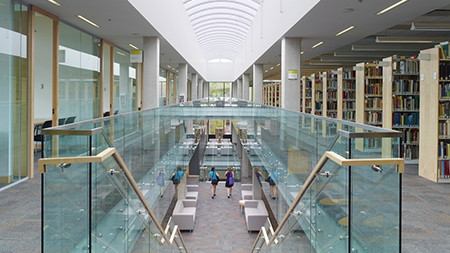
Harris Learning Library
The Harris Learning Library is a modern, award-winning library facility with comprehensive electronic database access to academic and research books, articles, theses and monographs, in combination with on-site library holdings. Casual and quiet study areas, on-site computer and photocopying/printing facilities, and group study and meeting rooms make the Harris Learning Library a focal point of the Nipissing University campus for undergraduate and graduate students alike.
Equipment and Software
Graduate students have access to a wide variety of software, include Microsoft and Apple products, and analytic software include SAS, STATA, SPSS and QSR. Both Apple and Microsoft computing platforms are supported, and there is wireless access throughout the university facilities. University technology Services (UTS) provides support for all software and hardware used at Nipissing University, and is a certified Apple computer repair centre.
Life Course Transitions
The CRC Chair in Life Course Transitions in Northern & Rural Communities is a federally-funded program of research that brings together faculty with expertise in social demography, education and work, gerontology, health informatics and health care delivery, Indigenous history, culture, contemporary social, economic and technological development, and criminal justice administration and law. Students in the M.A. in Sociology – Applied Social Research will engage with faculty and visiting scholars and post-doctoral researchers in applied research projects, investigating social problems and issues in northern and rural communities and elsewhere in Canada and abroad.
Post-Graduation Careers and Employment Opportunities
The Nipissing University M.A. in Sociology – Applied Social Research degree will provide students with the academic background and applied research and evaluation skills to work in a wide variety of occupations and fields where research, analysis and interpretation skills are required. Students graduating from the M.A. in Sociology – Applied Social Research degree will work as research and policy analysts in government, community and private organizations; as quantitative, statistical data analysts for government, community and private organizations, including ‘big data’ organizations such as credit card and internet-based companies; as highly-educated and qualified social service, police, customs, military and probation officers; as sampling and survey research designers and analysts; as qualitative research analysts and focus group facilitators with marketing and media research organizations; as social epidemiologists and demographers employed by healthcare and other government organizations; and as candidates for more advanced studies at the doctoral level in sociology, anthropology, criminology and related fields.

